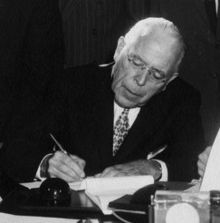David L. Lawrence
| David L. Lawrence | |
|---|---|

Lawrence in 1961
|
|
| 37th Governor of Pennsylvania | |
|
In office January 20, 1959 – January 15, 1963 |
|
| Lieutenant | John Morgan Davis |
| Preceded by | George Leader |
| Succeeded by | Bill Scranton |
| 51st Mayor of Pittsburgh | |
|
In office January 7, 1946 – January 15, 1959 |
|
| Preceded by | Cornelius Scully |
| Succeeded by | Thomas Gallagher |
| Member of the Democratic National Committee from Pennsylvania |
|
|
In office May 22, 1940 – November 21, 1966 |
|
| Preceded by | George Earle |
| Succeeded by | Joe Barr |
| Secretary of the Commonwealth of Pennsylvania | |
|
In office January 15, 1935 – January 17, 1939 |
|
| Governor | George Earle |
| Preceded by | Richard Beamish |
| Succeeded by | Sophia O'Hara |
| Chairman of the Pennsylvania Democratic Party |
|
|
In office June 8, 1934 – May 22, 1940 |
|
| Preceded by | Warren Van Dyke |
| Succeeded by | Meredith Meyers |
| Personal details | |
| Born |
June 18, 1889 Pittsburgh, Pennsylvania, U.S. |
| Died | November 21, 1966 (aged 77) Pittsburgh, Pennsylvania, U.S. |
| Political party | Democratic |
| Spouse(s) | Alyce Lawrence |
| Profession | Party delegate, Civil servant, Politician |
| Religion | Roman Catholic |
David Leo Lawrence (June 18, 1889 – November 21, 1966) was an American politician who served as the 37th Governor of Pennsylvania from 1959 to 1963. He is to date the only mayor of Pittsburgh to be elected Governor of Pennsylvania. Previously, he had been the mayor of Pittsburgh from 1946 through 1959. He was Pennsylvania's first Catholic Governor.
Lawrence was born into a working-class Irish-Catholic family in the Golden Triangle neighborhood of Pittsburgh, Pennsylvania. Too poor to attend college, Lawrence instead took a job as a clerk for Pittsburgh attorney William Brennan, the chairman of the local Democratic party and a labor movement pioneer. Brennan became a personal friend and mentor to the teenage Lawrence.
Lawrence entered the insurance business in 1916. In 1918 he enlisted in the United States Army to aid the United States effort in World War I, serving as an officer in the adjutant general’s office in Washington, D.C.
When he returned home from his army service in 1919, Lawrence was elected chairman of the Allegheny County Democratic Party. At the time, Pittsburgh was a Republican bastion, with Democrats holding wide support only in the lower class and among recent immigrants. With the help of future Pennsylvania Senator Joe Guffey, Lawrence led the rising Pennsylvania Democratic party that would soon dominate local and statewide politics. In the 1928 presidential election, David Lawrence worked hard for another Irish Roman Catholic politician who, like himself, had risen from the slums without the benefit of a formal education—Alfred E. Smith. The vicious anti-Catholic campaign that defeated Alfred Smith that year had a profound effect on Lawrence and convinced him that Roman Catholism was an insurmountable handicap in United States presidential politics. Consequently, at the 1932 Democratic National Convention, Lawrence deserted Al Smith's presidential campaign and delivered the Pennsylvania delegation to Franklin D. Roosevelt solely because of his fear of the religious issue.
...
Wikipedia
